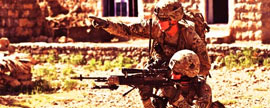The following is an extract from the book Move Out The Insider’s Guide for Military Leaders
Just as military units avoid committing their forces to diversionary attacks and feints, leaders must be alert to being drawn into minor skirmishes that sap their strength and divert valuable assets from the mission. On an individual level, personality conflicts are a prime example of this. Leaders can allow themselves to become snarled in clashes of personal style that take enormous amounts of mental energy and are ultimately self-defeating.
Example
SSG. Newnan worked for a section chief who was blunt to the point of rudeness. The chief’s attitude not only toward the members of his section, but to SSG. Newnan personally was extremely irritating. SSG. Newnan alternated between being mad at his chief and trying to figure out how to change the chief’s behavior. He attempted to talk directly to his chief about it, but every time he tried, the chief dismissed him with a brusque comment which infuriated him even more. SSG. Newnan found it increasingly difficult to work for his section chief and it began to show. After several months, the sergeant major took SSG. Newman aside one afternoon and said, “You’re a good squad leader and you’re wasting a lot of energy being angry with your chief. You’re right. He’s hard to get along with. That’s just the way he is and you aren’t going to change him. Get focused on the mission and on taking care of your soldiers. Don’t sweat the small stuff.”
Personality clashes aren’t restricted to senior subordinate relationships. They can also be a factor in dealing with co-workers and peers. When you let yourself become caught up in anger or frustration at a single individual, you are like the trainee who decides that her drill sergeant doesn’t like her and that nothing she does will ever be right in the drill sergeant’s eyes. In truth, the target of your aggravation rarely singles you out for special treatment. An objective look at their behavior will reveal that they treat others the same way, with the exception of their friends and superiors.
Unnecessary battles show up as conflicting approaches to problem solving. Your subordinate leaders may want to take one course of action, however, based on your experience you know there is a better way. Unless there are legal or safety issues, it is usually better to concede these conflicts to your subordinates, long before they reach the contentious debate phase. Your subordinates are the ones who will be doing the work. By letting them decide how to do the work, they are more committed because they own the solution. If it turns out that they have to do unnecessary work, chalk it up to learning for them.
Sooner or later you will encounter a boss who insists that you do things his way regardless of reasoning. This may mean requiring you to do things of limited value to the mission or telling you not to do something that you think is important. If you step back and look at the big picture, rarely do these matters have serious consequences in the long run. There are exceptions to this rule, for example when the boss’s directive would violate the Geneva Convention, but in general, mentally shrug your shoulders, salute, and tell the boss, “Yes, sir.”. Then do what you are told. Don’t waste your time and energy arguing or complaining. More than actual combat, these are the situations that inspired the old saying, this hill ain’t worth dying over.
The more time you spend as a leader, the more potential battles you will encounter. Use your experience to avoid getting caught up in the unnecessary ones and conserve your strength for the fights that actually make a difference. Look ahead to the potential outcome and pick your battles.
For More Information on this subject see the following resource(s):
Move Out The Insider’s Guide for Military Leaders
Mentor Military: https://www.facebook.com/MentorMilitary/
ASKTOP.net https://www.facebook.com/ASKTOP
Twitter: https://twitter.com/AskTOP
Newsletter: http://eepurl.com/bjcYH
Websites:
Feedback
We Appreciate your feedback!
Share Your Classes and Other Presentations: We are always looking
for examples, classes, briefings, SOPs, templates and other information we can
share for free in the ASKTOP.net Resource Center. Please help us help others by
sending your ARMS ROOM stuff to: mark.gerecht@mentorinc.us














